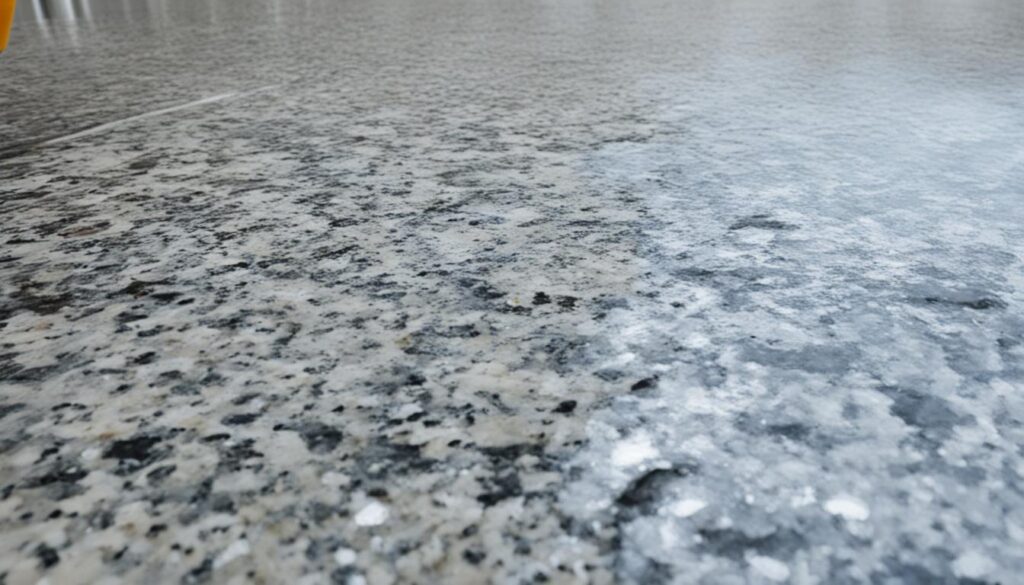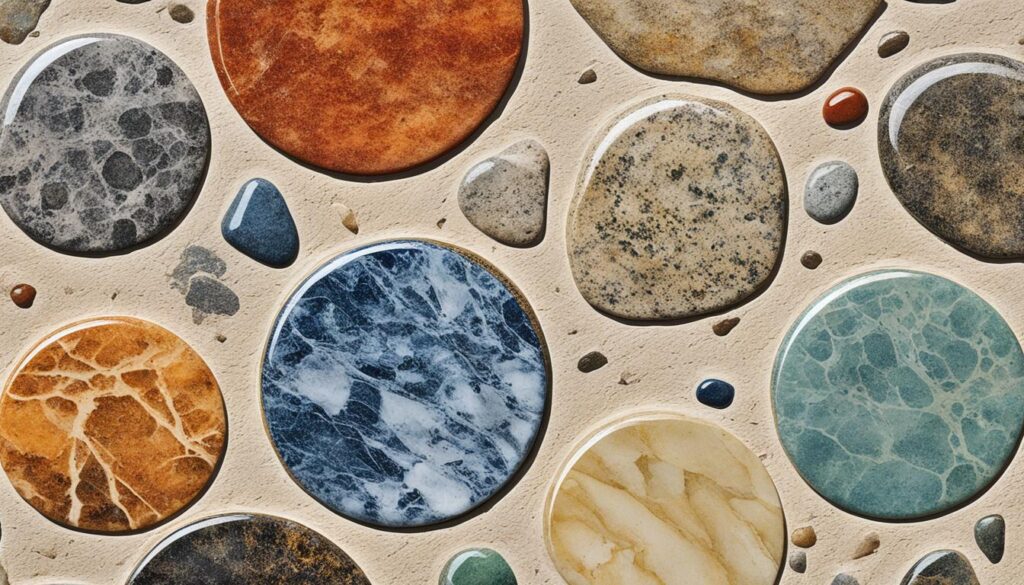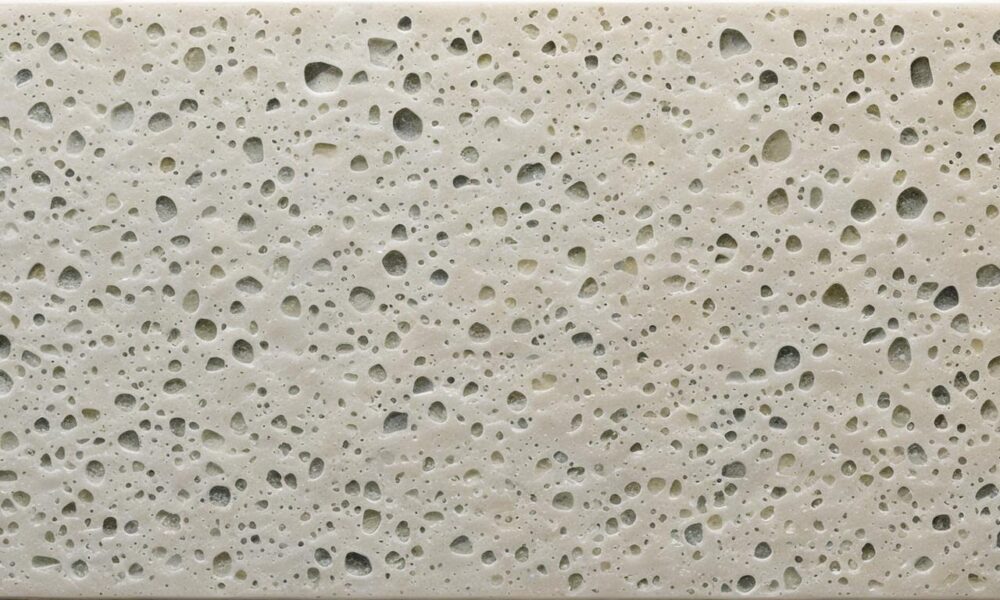Ultimate Guide to Natural Stone Care Tips
The beauty of natural stone in your home does more than look good; it needs proper care. To keep marble entryways and granite countertops looking their best, know the stone’s needs. This guide covers natural stone care, marble cleaning, granite sealing, and more. Learn the right ways to maintain your stone, and it will keep looking luxurious and stay durable.
Key Takeaways
- Identify whether your stone is calcareous or siliceous to determine the safest cleaning products.
- Prevent damage from acids by using mild, non-acidic cleaners for calcareous stone like marble.
- Implement daily maintenance habits to prolong the life and appearance of your natural stone surfaces.
- Ensure granite sealing is done periodically to protect against stains and spills.
- Consult a professional for tailored stone maintenance advice to keep your stone in pristine condition.
Understanding Your Stone’s Unique Composition
The world of stone restoration and stone maintenance heavily relies on knowing your stone. This knowledge starts with learning about the geological type of your stone. Different stones need different care and cleaning methods to keep their beauty.
Marble has calcium carbonate, making it sensitive to acids. So, it needs careful cleaning. Stones like granite contain hard minerals such as quartz. They are stronger but can still get damaged by the wrong cleaning products.
| Stone Type | Composition | Sensitivity | Recommended Maintenance |
|---|---|---|---|
| Calcareous (e.g., Marble) | Calcium Carbonate | High to Acids | Gentle, pH-neutral cleaners |
| Siliceous (e.g., Granite) | Quartz, Feldspar | Moderate to Low | Non-acidic, non-abrasive cleaners |
| Other Varieties (e.g., Slate) | Mixed Minerals | Varies | Professional assessment suggested |
Caring for natural stone properly improves its durability and beauty. Every stone is different, so care must be tailored. Adopting the right stone maintenance practices ensures your stone’s long life and beauty.
Stone restoration is about focused care and knowledge. Caring for your natural stone now keeps its beauty alive for the future.
Natural Stone Care Basic Practices
Keeping your natural stone surfaces in top shape requires some key daily habits. These habits help ensure areas like granite, marble, or travertine stay clean and bright. Doing so lets them last longer.

Utilizing Coasters and Trivets
Marble cleaning begins with prevention, making the use of coasters crucial. This habit helps avoid etching and stains from drinks like soda or lemonade. Hot items can also hurt stones like granite, so using trivets is vital.
Dust Mopping and Rinsing Spills
Regular dust mopping keeps stone floors safe from scratches. Spills should be blotted right away, not wiped, to avoid spreading. After blotting, a simple water rinse can prevent stains. For keeping countertops shiny, use mild soap solutions without acid.
The Role of Sealing in Stone Maintenance
Using the right sealers is crucial for natural stone care. Sealing helps granite and similar stone resist stains and makes cleaning easier. But different stones need different sealing care, so it’s wise to get professional advice. Always choose non-toxic sealers, especially in areas used for food prep.
| Stone Type | Recommended Daily Practice | Sealing Advice |
|---|---|---|
| Marble | Use coasters, wipe spills with non-acidic soap | Annual sealing with food-safe impregnator |
| Granite | Dust mop, use hot pads for heat protection | Seal every 2-5 years, depending on traffic |
| Travertine | Seal holes, use non-abrasive cleaners | Bi-annual sealing with appropriate stone sealer |
Identifying Types of Stains on Natural Stone
If you’re exploring stone maintenance, you’ll find it’s vital to identify the stains on your stone. Looking to keep your slate spotless? Recognizing the types of stains is your first move for effective slate repairs. Knowing if a stain is oil-based, organic, metallic, or biological lets you tackle stone restoration more accurately.

Let’s look at common issues on natural stone surfaces. A dark, greasy film on your countertop points to an oil-based stain. You must act fast. Such stains can penetrate porous stones, making simple cleaning tough. Organic stains, like from coffee or leaves, leave a color trace that aids in pinpointing the problem.
How do we handle these unwelcome marks? Here’s a straightforward approach for each kind:
- Oil-Based: Use a stone poultice or cleaner made to dissolve and remove grease.
- Organic: Try a mix of 12% hydrogen peroxide with a bit of ammonia, great for light-colored stones.
- Metallic: A poultice can extract metal particles embedded in the stone.
- Biological: Algae, mildew, and mold should be treated with a diluted cleaner that has non-chlorine bleach or ammonia.
Regular stone maintenance lessens the chance and severity of stains. Knowing how to conduct the right slate repairs and restoration keeps your stone looking great. Handle stains quickly and correctly to avoid complex restorations, keeping the stone’s beauty intact for years.
Deep Cleaning Techniques for Different Stone Types
Keeping stone surfaces beautiful is key when deep cleaning. Different stones like marble, granite, soapstone, and quartzite need special care. To keep these surfaces luxurious, choose the right cleaners and methods for each type. Following the maker’s advice helps keep your natural stone perfect for years.
Cleaning Granite and Marble Countertops
Granite and marble countertops are loved for their beauty and toughness. They need careful cleaning. Use only marble-safe cleaners to avoid damaging its porous surface. Granite needs products made for its tough surface, too. Taking care of these countertops makes them look better and last longer.
Tackling Soapstone and Quartzite
Soapstone counters are non-porous and resist heat but need care sometimes. Just a bit of mineral oil brings out its color and protects it. Quartzite counters last long but need gentle, pH-neutral cleaners to stay beautiful. Regular cleaning keeps your countertops as nice as when you first got them.



